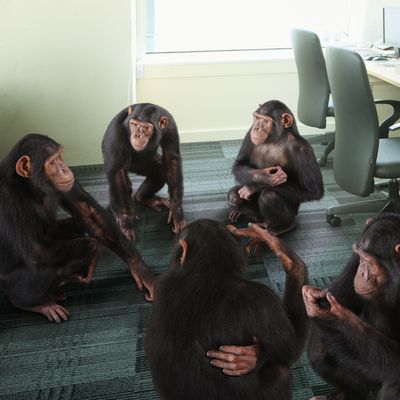
When you think about the phrase “office politics,” you might imagine a sort of Machiavellian chess game, full of complicated manipulation and backstabbing. And sometimes it is. Or maybe you think of something more subtle: gossip, strategic sucking up, carefully choosing when to call in your favors. It can be that, too. But there’s one thing that office politics definitely isn’t, and that’s uniquely human. Scientists studying our closest animal cousins have found that apes and monkeys practice a lot of the same kind of alliance-building, ladder-climbing, nepotism, and takeovers that we tie-wearing primates do.
For humans and for other primates, these types of interactions are built on our ability to form strong relationships. If you want to take someone down — an alpha monkey in the jungle, or a rival co-worker in the office — you’ll need allies. And the best allies aren’t just cronies of convenience. They’re real friends.
“You need repeated interactions with the same individual,” explained James Higham, an anthropologist at New York University. “Primates form these kinds of relationships all the time and maintain them all the time.”
To create crucial relationships, apes and monkeys practice the oldest form of “You scratch my back, I’ll scratch yours”: “They are literally scratching each others’ backs,” explained Larissa Swedell, a biological anthropology professor at Columbia University. Baboons, chimpanzees, and plenty of other primates get to know each other through activities like grooming, which Swedell likens to humans chatting around the water cooler.
These are the sorts of casual interactions that build up over time into something more meaningful — when you see a couple weak monkeys taking on a stronger one, there’s a good chance the alliance has been long in the making. “Anything that happens is a gradual accumulation,” Swedell told me.
Perhaps that’s why Higham says some of the strongest ape and monkey alliances are between family members – which, he points out, is true for humans, too. You may not be that close to your uncle, but he still might still give you a job.
As far as primate relationships go, a lot depends on how long you’ve been in a given social group. In some species, like bonobos, our closest cousins, females often stay in one group their whole lives. Males, on the other hand, often bounce between groups in search of females to mate with. As a result, female bonobos tend to have strong bonds, while male bonobos have much weaker social ties.
Chimpanzees, our other closest cousins, are the reverse: Males stay in their group, while females go off to look for mates. Among members of this species, male bonds are stronger, while female newcomers have very little power.
Whoever does the moving around, though, joining a new group means building social ties all over again: “You turn up in a new group and don’t know anyone,” Higham says, much like starting from scratch with your work friends when you get a new job. Primates who stick together watch out for and even fight for each other, which is probably why newcomers have such a tough time ascending the social ladder.
Once primates hang around each other long enough to form relationships, they start doing something that should sound pretty familiar to office workers and politicians alike: building coalitions. Primates with coinciding goals team up to maximize their own interests, and anyone, no matter how low status, can turn out to be a valuable ally: Two powerful primates can bully a weaker one, which is sometimes called a “conservative coalition”; alternatively, a high-status and a low-status primate might join forces against a mid-ranking primate, which is a “bridging” coalition. And when low-status primates join up to defeat more powerful members of their group, that’s a “revolutionary coalition.”
Not that primate politics is all about fighting. Female crested macaques, for instance, are pretty egalitarian, and primatologists sometimes have trouble even figuring out who outranks whom, Higham says. By contrast, rhesus macaque females have a “despotic, nepotistic hierarchy where social status is everything.”
Across primate species, though, culture plays a role in determining the character of a specific social group. Think about how some workplaces are rigid and hierarchical, while others are friendly and egalitarian, or about how mobility is easy in some offices and virtually impossible in others.
It’s hard to directly compare humans to other primates without upsetting primatologists, but there’s one thing we definitely share with many of our cousins in the animal kingdom: Volatile social dynamics that can shoot members to the top of the ladder or send them rocketing to the bottom. In our lives and in theirs, deep alliances matter, and power change-ups are to be expected, no matter how secure someone on top looks or how weak someone on the bottom feels. So we always keep one eye on those around us.
“If you go to a zoo,” Swedell points out, “You’ll notice that the primates are busy looking at you.”




